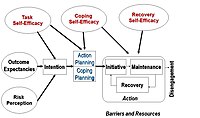
Photo from wikipedia
BACKGROUND In the Netherlands, HPV-vaccination uptake among 12-year-old girls remains to be lower (61% in 2016) than expected. The present study is about 1) replicating the extent to which social-psychological… Click to show full abstract
BACKGROUND In the Netherlands, HPV-vaccination uptake among 12-year-old girls remains to be lower (61% in 2016) than expected. The present study is about 1) replicating the extent to which social-psychological determinants found in earlier cross-sectional studies explain HPV-vaccination intention, and 2) testing whether HPV-vaccination intention, as well as other social-psychological determinants, are good predictors of future HPV-vaccination uptake in a longitudinal design. METHODS A random sample of mothers of girls invited for the vaccination in 2015 was drawn from the Dutch vaccination register (Praeventis) (N=36,000) and from three online panels (N=2483). Two months prior to the vaccination of girls, their mothers were requested to complete a web-based questionnaire by letter (Praeventis sample) or by e-mail (panel samples). HPV-vaccination uptake was derived from Praeventis. Backward linear and logistic regression analyses were conducted to examine most dominant predictors of HPV-vaccination intention and uptake, respectively. The total sample used for data analyses consisted of 8062 mothers. Response rates were 18% for the Praeventis sample and 47% for the panel samples. RESULTS HPV-vaccination intention was best explained by attitude, beliefs, subjective norms, habit, and perceived relative effectiveness of the vaccination; they explained 83% of the variance in HPV-vaccination intention. Intention appeared to be the only stable predictor of HPV-vaccination uptake and explained 43% of the variance in HPV-vaccination uptake. CONCLUSIONS These results confirm what was found by earlier cross-sectional studies, and provide strong leads for selecting relevant targets in the planning of future communication strategies aiming to improve HPV-vaccination uptake.
Journal Title: Preventive medicine
Year Published: 2017
Link to full text (if available)
Share on Social Media: Sign Up to like & get
recommendations!